Update December 28, 2017: Hi-Tech Pharmaceuticals has appealed the Magistrate Judge's decision denying their request to release the recently-confiscated DMAA. This is the last "short-term" stand to get DMAA back, outside of the greater DMAA lawsuit appeal, which was the longer-term play.
You can download the appeal here, then see the summary below in this gray box.
The Hi-Tech Appeal to Amend Terms of their Release (ie get Confiscated DMAA Back and Resume Manufacturing)
This appeal brings up the following topics, but #2 is where new informaton has come to light:
-
Alleged Bail Reform Act Abuse
Hi-Tech argues that the bond agreement (under duress) to stop manufacturing and selling DMAA constitutes overreach and does not satisfy the minimum requirements of the Bail Reform Act - especially since DMAA was never a part of the indictment in the first place.
-
New Information from the USPLabs case!
All throughout the Hi-Tech vs. FDA saga has been another ongoing case: USA vs. USPLabs. Hi-Tech has found the following information from this case, which is relevant to their overall arguments for DMAA as a supplement (see page 8):
B. Newly Discovered Evidence Further Demonstrates that the FDA’s Current Position Regarding DMAA Is Incorrect.
Subsequent to the filing of the motion to amend and the hearing on that motion before the magistrate judge, counsel for Mr. Wheat and Hi-Tech became aware of evidence demonstrating the Government’s prior acknowledgement of DMAA’s safety and legality. These documents, which were produced by the Government in an unrelated case captioned USA v. USPLabs LLC, et al., No. 3:15-cr-4796 (N.D. Tx.) (the “USPLabs action”), reveal that, as far back as 2010, the FDA considered DMAA a dietary ingredient under DSHEA and that it did “not have any evidence to show a hazard” related to the use of DMAA. Doc. 252-1 at 12-14 in USPLabs action, attached hereto as EXHIBIT A (March 29, 2010 emails between Quyen Tien and James Lin). In 2011, the FDA again reiterated that it lacked evidence to conclude that DMAA is “harmful” or “adulterated”. Doc. 319-24 in USPLabs action, attached hereto as EXHIBIT B (March 30, 2011 email from Robert J. Moore to Quyen Tien).
Unfortunately, since the USPLabs case is an ongoing criminal matter, you won't find those documents anywhere and can consider that case to be a "ghost case" until it's over.
Here's another snippet, allegedly stated by Robert J. Moore of the FDA, sent in 2011:
"I don’t know what basis we would use to declare [DMAA] adulterated. To my knowledge, we have not determined that this substance is harmful. Nor has anyone submitted to us evidence that the substance is not a constituent of geranium oil. While some dispute that this substance is a natural constituent of the oil, no such evidence has been provided to us. Accordingly, we do not see a basis ot [sic] conclude that the substance or a product containing it is adulterated because it is a poisonous or deleterious substance."
EXHIBIT B (emphasis added).
A FOIA could possibly be filed to get those specific emails, but for the time being, we'll settle for the above paragraph.
Also, given that Quyen Tien is on the original warning letters to USPLabs (now taken off the main FDA site but archived here and here), this gentleman seems incredibly instrumental in the takedown on DMAA.
Remember, it is the FDA's burden to prove it unsafe, which they seem unable to do, and this new evidence adds to that.
-
DMAA is *still* not "banned" or illegal!
Hi-Tech reminds the judge that Judge Hunt's recent decision to side with the government in the main DMAA FDA lawsuit (which Hi-Tech has appealed) only has to do with the DMAA confiscated back in 2013 that started this whole ordeal - which is a civil matter. They argue that it the case does not make DMAA illegal and there is still no *law* on the books regarding DMAA!
As such, they still cannot get their confiscated DMAA from 2013 back, but "DMAA is not charged in this indictment because the Government cannot prove that it is illegal", per this appeal.
Had the government had proof of illegality or public danger, Hi-Tech argues the FDA could have sought a de-facto injunction against Hi-Tech *immediately* last year. But they don't -- so they didn't -- and they had to resort to these "other" tactics using the Bail Reform Act to get after it.
The Bail Reform Act is not a Hammer for the Government
Hi-Tech's appeal here concludes with the following sentence:
The Bail Reform Act was not created to give the Government a hammer to gain an advantage in a civil case in which the court did not order that Hi-Tech – and others – cease production and marketing of DMAA containing products.
We'll of course keep up to date with the status of this appeal - because it's the last short-term stand to get DMAA back into production.
Appeal to be filed (see above): However, Hi-Tech is appealing this motion's dismissal to the district judge, which should happen mid-January 2018, so stay tuned. Until then, they cannot manufacture or sell any more DMAA-based supplements.
In the motion's denial, the judge basically stated that it is not his purpose to re-examine Judge Hunt's case in the DMAA lawsuit, and that Hi-Tech needs to take their arguments to the 11th circuit. That's exactly what they're doing, as they've already filed their DMAA lawsuit appeal!
Long-term, the appeal to the 11th circuit stands as the *major* stand for DMAA (which is found in nature in geraniums), and we expect all DMAA supplements to be going out of stock unless Hi-Tech can get this motion reversed in January 2018.
Stay tuned to this blog for updates on the motion's appeal.
There's a lot happening with Hi-Tech Pharmaceuticals and their ongoing battles with the FDA, and the latest court documents help straighten things out.
Setting the stage, there are three separate ongoing issues:
-
The ongoing DMAA Lawsuit over its legality as a dietary supplement ingredient.
Hi-Tech has filed a motion to get their wrongfully confiscated DMAA back. If you thought this case was crazy before this, then wait until you see how low the FDA has sunk this time.
Today's article does not focus on that, but the long story short is that this case's court documents proved beyond a shadow of a doubt that DMAA is a natural constituent of geranium flowers (if even in small amounts), thereby qualifying it for consideration as a dietary supplement.
However, the judge decided that basis in nature wasn't enough, and went above anything Congress ever wrote into 1994 DSHEA, claiming that DMAA was a supplement ingredient because it was not extracted into any supplement.
This opinion, which Hi-Tech has claimed was "legislating from the bench", opened the door for appeal, and Hi-Tech is filing their appeal this month. This article does not get further into the lawsuit, as we're waiting for the appeal.
-
The confiscation of Hi-Tech's DMAA supplements during a raid regarding a Red Yeast Rice supplement...
...to the tune of 109 pallets of product worth $19 million in retail -- and a coerced "agreement" made under duress stating that Hi-Tech could no longer sell or manufacture with it.
This fight -- many have called entrapment or downright blackmail -- will be the focus of today's article below.
-
Hi-Tech's temporary discontinuation of their legal DHEA-based prohormones, mainly 1-DHEA ("1-Andro") and 4-DHEA ("4-Andro"), followed by 19-NorAndro.
The FDA did the unthinkable: they withheld Wheat's medication and left his 15 year old daughter home alone, only allowing him to get out of prison and back to his daughter if he agreed to stop manufacturing and selling DMAA
In the "Red Yeast Raid" cited above, the FDA included charges accusing Hi-Tech Pharma of adulteration of their products with illegal schedule III substances, and will be the focus of our next article.
The long story short is that the FDA used admittedly inferior and non-specific lab tests to "determine" that illegal substances were allegedly in Hi-Tech's products... but upon further and more specific lab testing of those same product lots, the FDA's accusations are falling flat.
But just to make sure nothing was wrong, Hi-Tech temporarily stopped production, got real lab tests done, and are now resuming production because their DHEA metabolite prohormones came back clean! More on this later in the next article, with lab tests to boot.
While these are completely separate issues, the FDA has managed to bleed them together, successfully using them get Hi-Tech's DMAA off the market. If Hi-Tech has their way, that decision will only be for a temporary amount of time.
A recap on the "Red Yeast Rice Raid"
We left off in early October 2017 with Hi-Tech Pharma losing their ability to make or sell DMAA, as mentioned above in the second point. A great recap of this story was told on our YouTube channel, which you can watch below:
So in summary,
-
Hi-Tech allegedly sold small amounts (to the tune of just thousands of dollars) of a Red Yeast Rice cholesterol supplement that contained a naturally-occurring constituents that the FDA (and their friendly lobbyists) prefer to have sold as a drug;
-
Hi-Tech transferred some of that money across bank accounts in order to buy a new manufacturing facility;
-
The FDA charged that those supplements were illegally adulterated, and since the money was transferred, they got the IRS to throw in all kinds of wire fraud and money laundering charges;
-
To top it off, they claimed that Hi-Tech's DHEA metabolite prohormones were adulterated with illegal substances (again, this will be the subject of a future article, with lab tests of the same lot numbers included).
When Jared Wheat was indicted for these seemingly-bogus charges, the FDA did the unthinkable, as new court documents below show: they withheld his medication and left his 15 year old daughter home alone, only allowing him to get out of prison and back to his daughter if he agreed to stop manufacturing and selling DMAA - at least temporarily.
It's hard to believe, but this case has gone from crazy to downright insane.
Left with this impossible decision, Wheat agreed to it, knowing that he could get the order quashed at a higher court, which is what Hi-Tech filed below.
So as many have seen, there's been a run on DMAA, with prices rising on products such as the legendary APS Mesomorph. But now it's time for Hi-Tech to fight back.
Hi-Tech Files a Motion to Amend the Terms of Wheat's Pretrial Release
On November 10th, 2017, Wheat and Hi-Tech Pharma filed a motion to amend those DMAA-based conditions of his pretrial release. The document is below, and it paints an extraordinarily sad and scary picture about what the government is willing to do to you if you challenge them over something they care about:
See the Documents (Updated with the actual warrant!)
When Wheat and co-defendant Brandon Schopp appeared before magistrate judge Alan J. Braverman, Assistant United States Attorney Steven D. Grimberg indicated the following:
There’s also nonfinancial conditions.... With regard to all three defendants, we do request that they be prohibited from manufacturing and selling misbranded drugs and adulterated foods.... I do want to note that the adulterated foods would include products containing DMAA.
-- US Assistant Attorney, Steven D. Grimberg
Remember, in the indictment over Red Yeast Rice and DHEA metabolite prohormones, DMAA is not mentioned a single time. Not once.
The ongoing DMAA lawsuit had nothing to do with this indictment.
Yet this would have kept Wheat in prison for at least three days, with his daughter at home alone and he without medication. So he made the impossible decision -- he agreed to the government's "extortion", or "blackmail", as he calls it ("a product of coercion" is how the lawyers put it) -- because family comes first.
The immediate confiscation
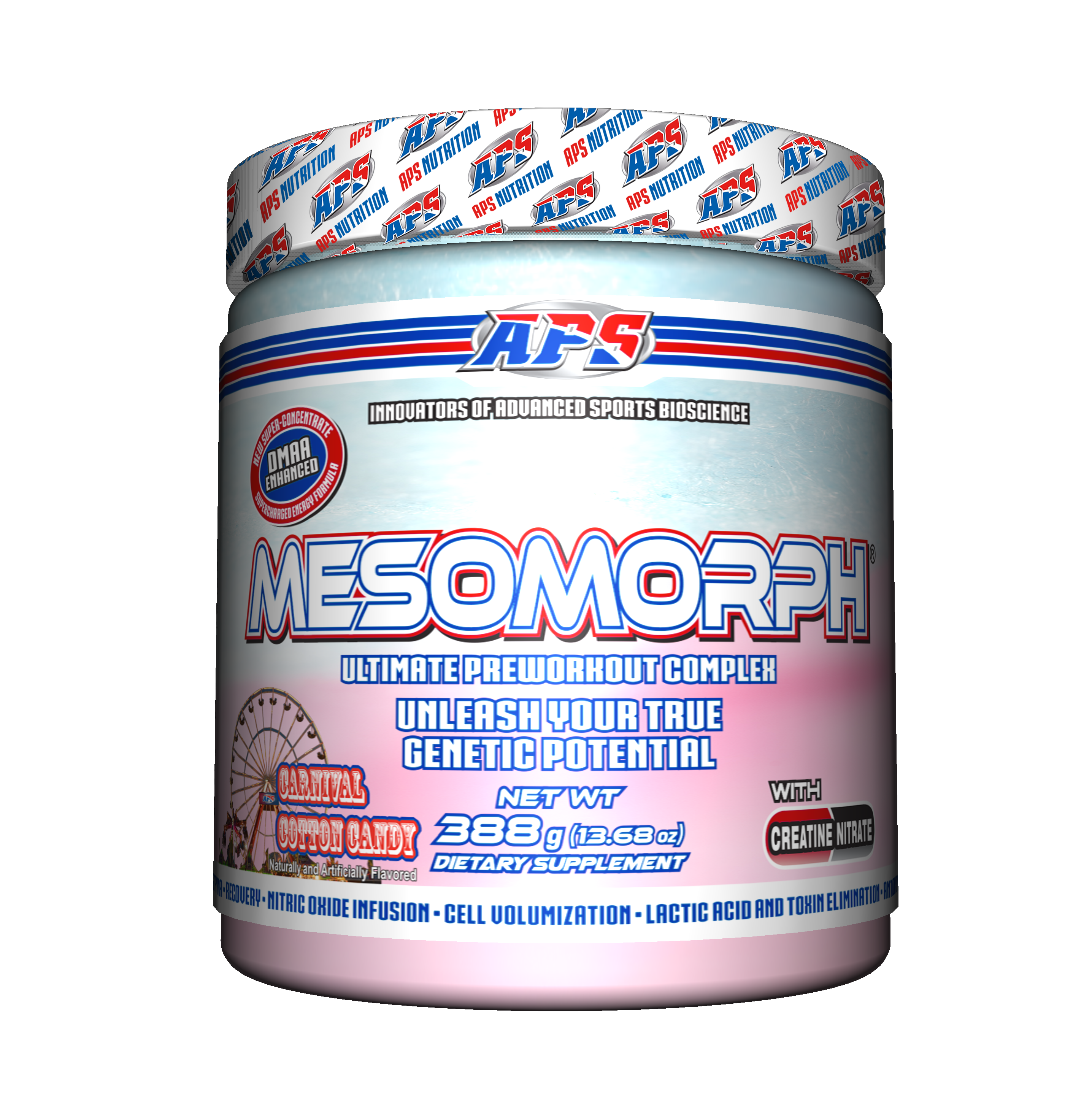
A likely very large amount of the confiscated supplements were pallets of the #1 selling pre workout supplement, APS Mesomorph.
After his release, the FDA could then get what they really came for - the DMAA supplements. They were then raided (along with hard drives and production test records, amongst other things). Hi-Tech claims that 73 agents then used at least five tractor trailers to take away 109 pallets of DMAA-based products worth $19 million.
Additionally, the government allegedly then seized bank accounts totaling $3.4 million, which forced the unfortunate layoffs of about 70 factory employees and even more sales representatives, and still threatens at least 100 more jobs.
Make no mistake, the FDA's plan was working as intended. They are using non-DMAA (and potentially illegal) accusations to drain the life-blood from this company. All this for an ingredient that has repeatedly been found in nature -- despite the government/taxpayer-paid researchers' best attempts to cover up that absolute fact.
...it is becoming increasingly apparent that the FDA is now using this criminal case to stop Hi-Tech from manufacturing and and marketing products containing DMAA, despite the fact that DMAA is not even mentioned in the indictment.
-- Hi-Tech Motion to Amend Pretrial Release Conditions
Remember: Hi-Tech's DMAA case destroyed the FDA's arguments
Hi-Tech's Motion repeats the facts we've already discussed on this blog. They call attention to the fact the FDA's case was so weak that they had to abandon their primary witness, Ikhlas Khan.
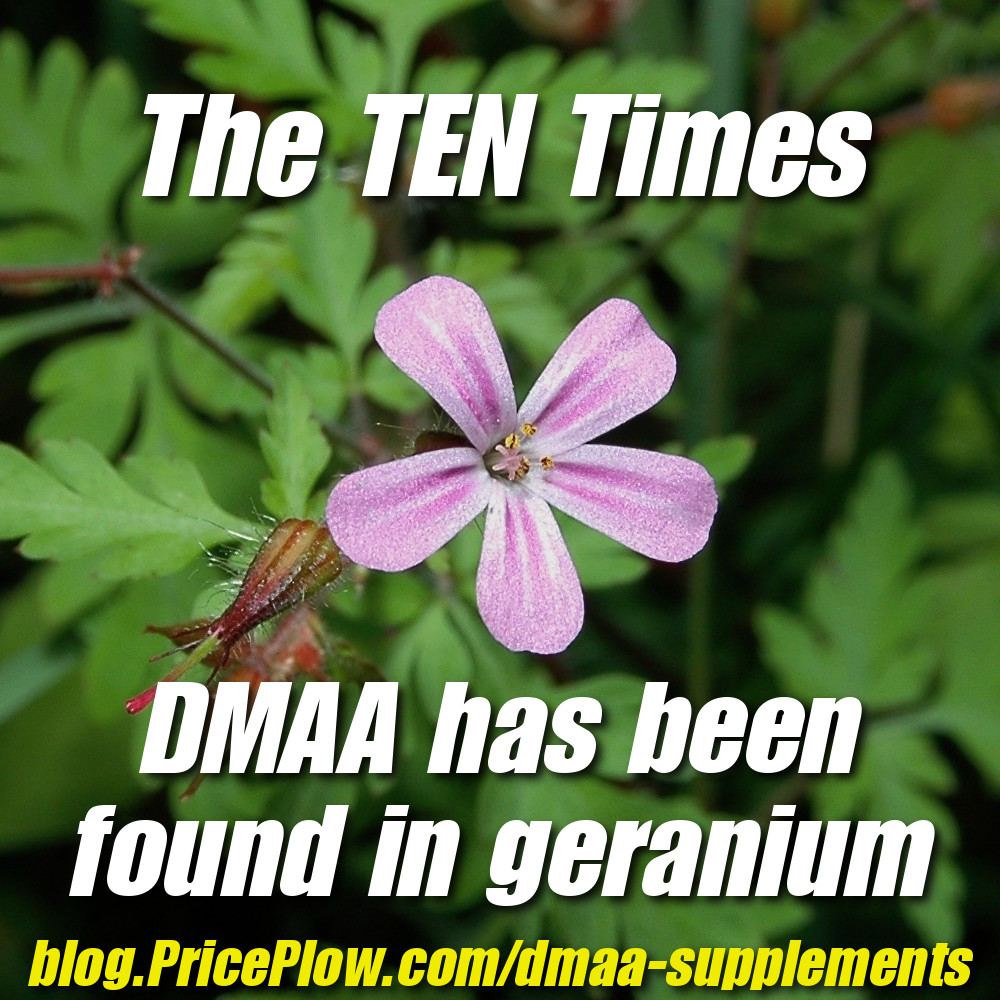
Although this isn't the subject of this article, it must be understood that researchers continually find DMAA in geranium - and several times they covered it up.
Khan is the researcher accused of "doctoring" two research studies (here and here) where DMAA was indeed found by the scientists, but they "unethically decided that such a conclusion could be hidden by simply raising the detection limit in the published articles so that a finding that no DMAA was detected could be reported", per Hi-Tech Pharmaceuticals.
The judge in that case even admitted that Hi-Tech “presented fairly substantial evidence that trace amounts of DMAA have been found in a species of a geranium plant in the form of three published papers that provided the details of tests detecting DMAA”.
Unfortunately, the judge also ruled that DMAA could not be considered a “botanical” as defined by 1994 DSHEA, because there was no “history of the substance in question [DMAA] having been extracted in usable quantities from a plant or a plant-like organism....” -- despite the fact that Iovate/MuscleTech researchers did just that (using Geranium Robertianum) in a Canadian patent!
After that ruling, the FDA tried to take it even further, recommending that Hi-Tech could no longer make DMAA - but the Judge ignored that request, per Hi-Tech Pharma's motion.
To the FDA's dismay, this kept DMAA on the market, and the Feds had to work the back door, as we've seen happen this fall. This was the "Red Yeast Rice" raid, which again, had literally nothing to do with DMAA.
"In short, the instant indictment has absolutely nothing to do with DMAA containing products, and the Government has not charged Hi-Tech or Jared Wheat with any wrongdoing involving DMAA containing products. The only action that the Government has taken in conjunction with Hi-Tech regarding DMAA is the in rem seizure action before Judge Hunt that involves only the DMAA containing products seized on November 5, 2013, and which is currently on appeal to the Eleventh Circuit."
-- Hi-Tech Motion to Amend Pretrial Release Conditions
The above section is important because when the FDA requested that the new magistrate judge agree to the court order banning Hi-Tech from manufacturing or selling DMAA, the FDA never told this magistrate judge they had had already tried to get such an injunction in the actual lawsuit case and failed!
The lengths a government scorned will go through
The story is sad, and it's scary.
Wheat's wife was unavailable for a week, and his daughter home alone. An impossible position. So we have to question - how did the FDA so perfectly time such a thing? Did they just happen to know about this situation at home? At this point, we're not putting anything past anyone.
Meanwhile, at the time of the arrest, Wheat had three medications to take, and the agents allegedly did not allow him to take his Hydrochlorothiazide medication for blood pressure. Hi-Tech claims that the arresting agents stated he could take the rest of his medication when transported downtown - but it turned out that he could not because they [very conveniently] had no medical personnel on hand there.
Upon his agreement to the government's "coercion", the US attorneys nearly immediately executed their next warrant for all of the DMAA. This leads to the next point in Hi-Tech's document: they reasonably claim taht this shakedown was meticulously planned and executed:
"It is becoming increasingly apparent, in light of both the pattern of the Government’s well-orchestrated actions against Hi-Tech in the past weeks – including the seizure of Hi-Tech’s bank accounts, the demand for the DMAA ban as a condition of Mr. Wheat’s pretrial release, and the massive seizure of DMAA related products and materials – that the Government has implemented a carefully planned assault with two goals in mind.
First, the Government has used these proceedings, the indictment, the coerced agreement to the DMAA as a condition of pretrial release, and the subsequent DMAA seizure to accomplish the goal that it had failed to accomplish in the in rem proceeding before Judge Hunt: to enjoin Hi-Tech from the manufacture and sale of DMAA containing products.
Second, the Government has used these proceedings – and likely will continue to do so, with the looming possibility of civil forfeiture actions and a superseding indictment – to put Hi-Tech and Mr. Wheat completely out of business and render them unable to mount a meaningful defense to the serious criminal charges they are facing."
Ultimately, Hi-Tech is demanding that they get their DMAA back, as it has literally nothing to do with the charges at hand. Further, they are playing to the fact that the US Government used extremely coercive tactics -- including the threat of emotionally damaging a minor -- to get their way.
Simply argued, the agreement was performed under duress, and that is why it should be reversed.
The DMAA takedown was likely illegal
There are precedences to cases like this, and in the past, the courts have sided with the citizens.
Hi-Tech argues that Dixon v. District of Columbia (1968) ruled that “The Government may not prosecute for the purpose of deterring people from exercising their right to protest official misconduct and petition for redress of grievances.”
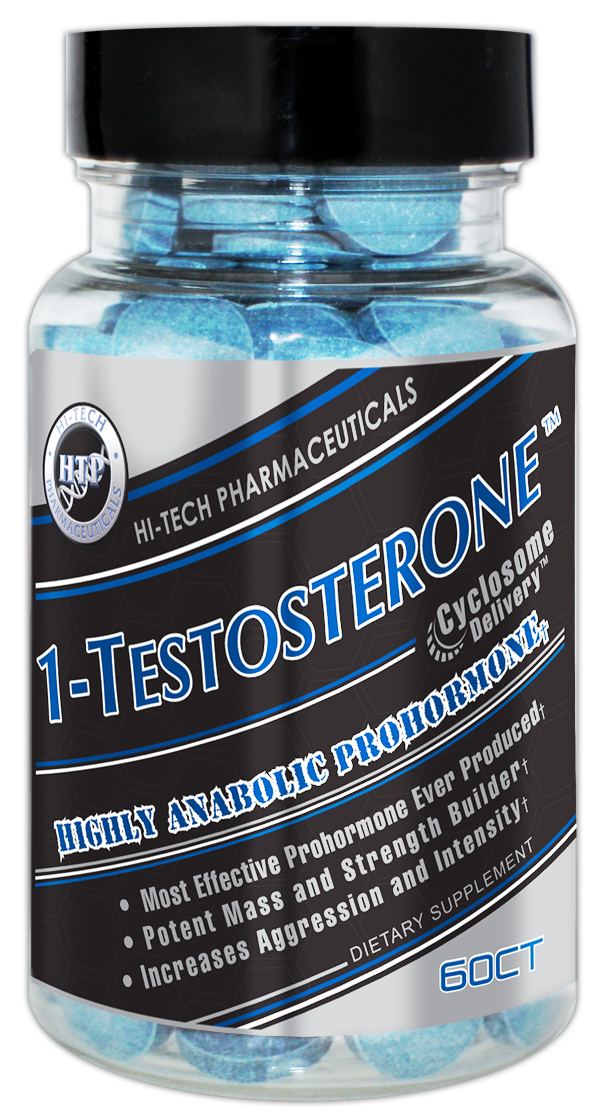
Hi-Tech's legal DHEA metabolite prohormones are back in production after they passed the tests that the FDA claimed they had failed!
Hi-Tech's arguments then detail the Dixon case, as well as the 1987 Newton v. Rumery, 1970 MacDonald v. Musick, and 1984 Shepard v. Byrd cases that protect citizens from such coercion. Time and time again, the courts have sided with the citizens when the government oversteps their own prosecutorial limitations.
The point is that the FDA needs to stay in their case's respective lane - in this case - a few thousand dollars from a now-discontinued supplement named Choledrene, as well as the DHEA metabolites to be discussed in the next post.
The Bail Reform Act covers such actions
Further, under the Bail Reform Act, the Court has authority to order pretrial release subject to an order that requires the defendant to “assure the appearance of the person as required and to assure the safety of any other person and the community”, and the bail must be high enough that they are not flight risks.
To ensure Wheat's "appearance" -- ie that he is not a flight risk -- it is clear that he is simply not a flight risk, given his family and business locations being well-known, and he always stick around to fight the fight in court.
Regarding safety, DMAA has been determined to be safe at doses Hi-Tech is using (with less adverse events than Vitamin C)!
Given those two data points, Hi-Tech's lawyers claim that he should have been bonded out without any additional actions, and thus demand that these completely irrelevant DMAA conditions be lifted.
Did they even have the authority to issue such an order?
Going even deeper, it seems that a magistrate judge does not even have the authority to issue an injunction at all! So they worked around that by calling it a "court order" -- and Wheat agreed to it (under duress) knowing that he'd be coming back for what was his. Well guess what - he's now back, and last week this motion for amendment was filed.
We should find out the response to this motion before December of 2017. And if that suspiciously fails, the official Hi-Tech appeal against the FDA will soon be filed as well - to be covered on this blog (in our DMAA Lawsuit article) once it's submitted.
A sad and devastating story, all at your expense
It's hard to believe, but this case has gone from crazy to downright insane. Hi-Tech claims that this is "government run amok", but we truly think that's putting it nicely. This is an absolute abomination.
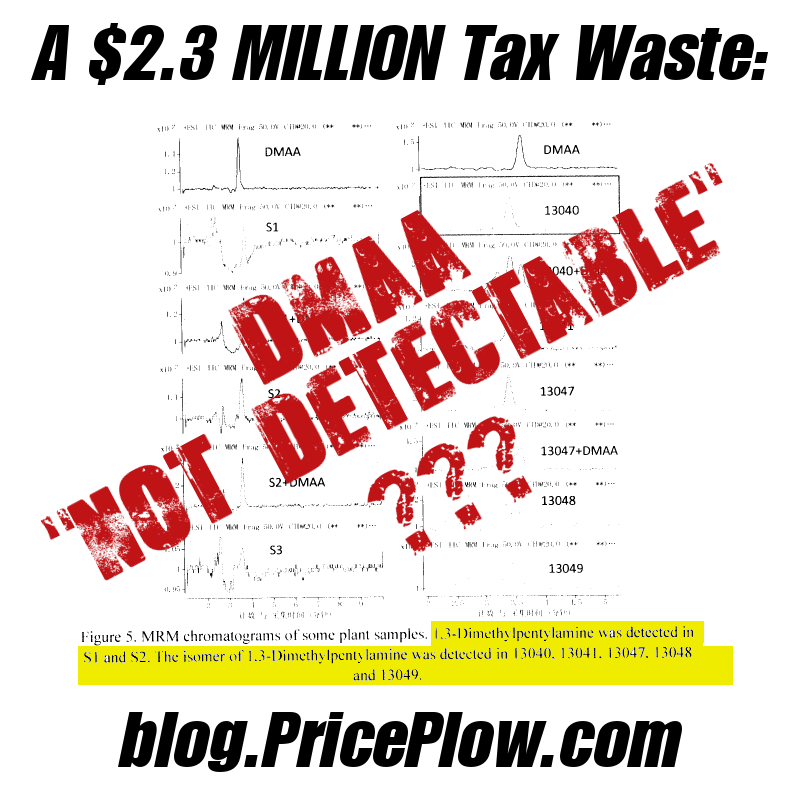
How can the title say DMAA was "not detectable" when... it was detected!?!?! This is the lunacy Hi-Tech is up against
We thought that the researchers' cover-up of DMAA's existence in geranium was crazy. We thought that the complete reversal of Daniel Armstrong's DMAA findings were beyond the question of ethics. And we again thought that the FDA's payment of $2,3 million in taxpayer dollars for a further 'doctored' study was even more belligerent.
But that is nothing compared to what they've done this time. Depriving a man of medication and leaving his underage daughter at home alone in order to get him to agree to something they couldn't win otherwise is quite simply pathetic.
We are completely ashamed of the FDA's irresponsible actions in this case, and can only hope that the district court judge sees what the lower-level magistrate judge did not - that this is a total travesty to the US justice system.
Further, we're seriously beginning to wonder why the FDA simply cannot face the fact that DMAA is a natural constituent of geraniums, or why they cannot accept that it's not dangerous in the appropriate doses that Hi-Tech is using.
Why on earth would they go to such ends to get this ingredient off the market?
What is so important about DMAA that it should cause this much stress, given that there are so very few adverse event reports of Hi-Tech's supplements? What bigger picture item are we all missing here, and who is behind it?
Something is seriously wrong here, and Hi-Tech isn't yet done fighting, but they no doubt have an uphill battle against a behemoth that will clearly fight dirtier than anyone we've ever seen.
Congratulations, Americans - these are once again your tax dollars hard at work.
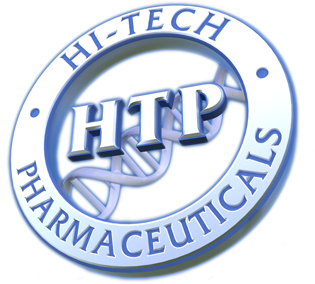




Comments and Discussion (Powered by the PricePlow Forum)